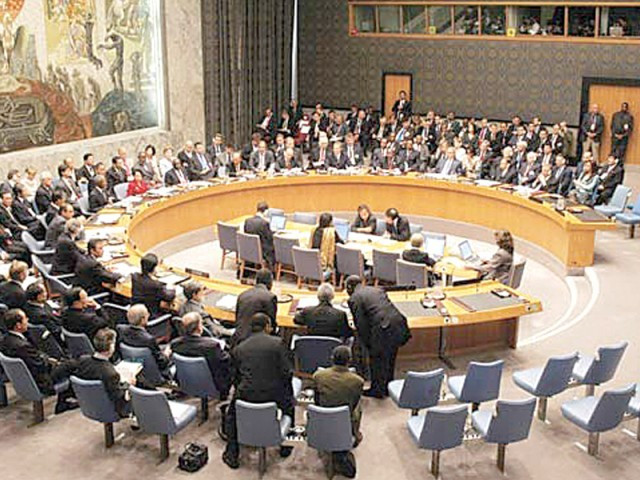First of all, let me clear the misperception that the criteria of contesting is directly linked to the internal domestic politics or economic situation prevailing in a country. It is not. The domestic environment is only important to influence the opinion of other member countries who will be voting.
Article 23 (1) of the UN charter states that in electing non-permanent members on the Security Council, “due regard….(will be paid)..in the first instance to the contributions of members of UN to the maintenance of international peace and security.” This essentially means contribution of troops from a member country in peacekeeping missions and participation record in UN in matters of peace and security.
Pakistan has been one of the top two contributors of troops in UN peacekeeping missions in the last decade or so despite the deteriorating security situation at home. In July 2011, with over 10,000 troops and police deployed, Pakistan’s contributions were just behind Bangladesh. It has served six terms at the council before. But this coming term 2012-13 will be the most important for the country so far. Here is why:
The war in Afghanistan, it's end game, terrorism and non-proliferation are vital affairs that will be active on the agenda of the Security Council. Pakistan is a direct stakeholder in all of them. As US and Pakistan fell out recently on the issue of how to negotiate with the insurgents, discussions taking place at the Security Council may increase in value. Which insurgents are to be declared as terrorists and which insurgents are wanted on the peace table will be few of the million dollar questions.
Diplomatic circles are ripe with speculations that the US may be behind the move of supporting Kyrgyzstan. They cite that otherwise Kyrgyzstan would have withdrawn its bid just like Fiji did earlier when Pakistan approached. Even just three days before the election, our Foreign Minister is making a visit to Bishkek to make one last effort. However, despite repeated pleas, including Prime Minister Gillani’s appeal, the Kyrgyz have decided to fight it out to the bitter end. The brilliant former diplomat, Munir Akram, noted in his recent oped:
“Obviously, Kyrgyzstan cannot defeat Pakistan since it cannot secure a two-thirds majority of 128 votes in the General Assembly. But, if its candidature is, indeed, being propped up by the US, it is possible that Pakistan could be denied a two-thirds majority.”
It would not be difficult to understand why theUS might be behind the Kyrgyz. With Washington looking for an extension of Manas airbase and Kyrgyzstan willing to consider it, the US thinks it can easily influence the Kyrgyz vote in the Security Council in important matters. A paper written by Ilyana Kuziemko and Eric Werker in 2004 argued how the US aid increases to countries when they are sitting on the Security Council seats to influence their decisions.
Kyrgyzstan is certainly an easier member country to work with when compared with its ally Pakistan, who is notorious in Washington for being one of the few countries that opposes US in multilateral diplomacy.
In one of the US cables of 2006, Ambassador John Bolton, rued the lack of harmony between Pakistan and US in the multilateral fora. The cable noted:
“Pakistan effectively uses its membership in the G-77, the NAM, the Asia Group, and the OIC to project its views and achieve greater influence at the UN than its standing in the international community would otherwise suggest. Pakistan's voting correlation with the US in the UNGA has been on a downward trend since 1996 and reached a record low of 17.4 percent last year."
This factor, other than anything else, will be in the minds of the US diplomats. The lobby working against Pakistan’s candidacy will be playing up the chances of a deadlock between Pakistan and India hampering the progress at the Council, since India is already sitting there finishing up the first year of its term. Pakistani diplomats need to highlight the recent rapprochement between the two countries and India’s support for the candidacy of Pakistan for this election. Further, Pakistan and India have served overlapping terms three times in the past, in 1968, 1977 and 1984. They do have a same stance on various multilateral issues.
The outcome of this election is far from predictable, as you never know what secret balloting results in on the given day. If Pakistan is able to get its way for the next two years, it will be very effective for the country to raise its voice and position on matters, which we deem important. Others may argue that it is punching above the weight.



COMMENTS
Comments are moderated and generally will be posted if they are on-topic and not abusive.
For more information, please see our Comments FAQ